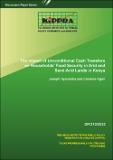| dc.description.abstract | This study investigated the impact of regular Unconditional Cash Transfers
(UCT) on household’s food security in arid and semi-arid lands (ASALs) in
Kenya. Using Propensity Score Matching (PSM), the study assessed the Average
Treatment Effect on the Treated (ATET) for two key food security outcomes. To
demonstrate robustness of the study findings, the study employed three matching
methods on the 2022 Kenya Demographic and Health Survey (KDHS) data to
estimate the impact of the Inua Jamii programme on the beneficiaries. The study
focused on 3,444 households from the arid region and 6,182 households from
the semi-arid region. The study specifically analyzed data from households that
either received the UCT (treatment group) or did not receive the UCT (control
group). The results show that cash transfers had a positive impact on food
consumption in ASALs. In the arid lands, beneficiaries on average experienced
an increase in their food consumption score by 3.4 per cent. In the semi-arid
lands, beneficiaries on average increased food consumption score by 1.4 per
cent, though not statistically significant. However, cash transfers did not
significantly improve households' coping strategies during food shortages in the
arid region, where the coping strategy index score on average increased by 2.9
per cent. In the semi-arid region, the coping strategy index score decreased on
average by 6.8 per cent, indicating progress towards the use of less destructive
coping strategies during food shortages. Expanding unconditional cash transfer
programmes in arid regions to cover more households is imperative. However,
it requires other complementary interventions and continuous monitoring.
Collaboration between the government and donors is crucial in formulating
effective crisis management strategies in arid and semi-arid areas. In semi-arid
regions, where cash transfers did not significantly influence food consumption,
there is need to adjust the transfer value and programme efficiency. | en |

